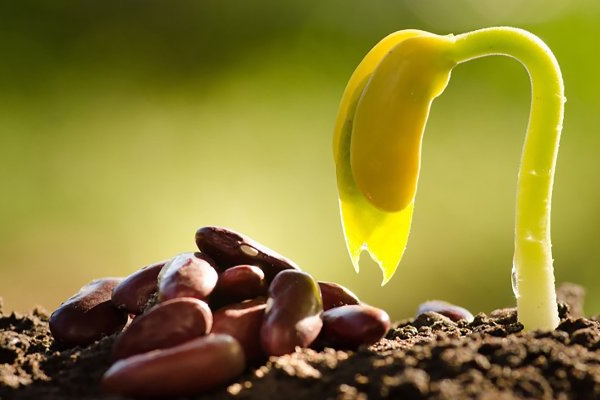No seeds, no agriculture—it's a universal truth. However, it took Professor Leónie Bentsink five years to convince her colleagues and the industry of the importance of seed research. Now, Seeds for the Future is flourishing, with an increasing number of companies participating.
Seed research is on the rise. More and more companies in the seed sector are embracing the collaborative project Seeds for the Future, an initiative by Professor Leónie Bentsink. Moreover, Wageningen University & Research has recently appointed a seed technology researcher to meet the growing demand for seed research. The sector has a significant need for various forms of applied research.
It makes perfect sense, according to Bentsink: "We are dealing with climate change and the fact that many crop protection products are no longer permitted. The seed is your starting material; without high-quality seeds, there is simply no agriculture. The Netherlands is excellent at producing vegetable seeds, with many originally family-owned businesses performing well in the international market. The sector is worth 2 billion euros annually, yet oddly enough, very little is invested in the related science. While there are countless questions that need answering. Think about improving seed germination, breeding climate-resilient varieties, researching seed storage, or developing a method to determine seed quality. These are all valuable research topics that the industry can directly benefit from."
Putting seed quality on the map
It was a close call and Bentsink could have been the last person to turn off the lights at Wageningen Seed Science Centre. Where once 87 people worked – when it was still called the Rijks Proefstation voor Zaadcontrole – she was the only one left after Dr. Steven Groot retired last year. How did that happen?

"Unfortunately, no policy was made for it,' Bentsink explains, 'and that's a problem throughout Europe; there is less and less attention and funding for seed research. Which is quite strange. Farmers and seed companies ultimately have only one wish: seed that is of such high quality that it germinates and grows into a healthy plant regardless of conditions. I do fundamental research myself, but we also need people who can apply the knowledge. Now that more and more companies are joining Seeds for the Future, I have hope that seed research at Wageningen University & Research will grow again. Yes, I find that important. If we want to be a knowledge society and Wageningen is the hotspot for plant research in the Netherlands, then I feel the responsibility to keep highlighting such an important topic as seed quality."
"We regularly have companies contacting us wanting to participate in Seeds for the Future', says Monique van Vegchel, policy specialist at Plantum. The trade association for breeding companies and young plant growers was pleased that Leónie Bentsink reached out to discuss collaboration: 'It's great that Wageningen University & Research has appointed a full-time seed technology researcher again. Now that more and more crop protection products are being banned, you can look for other means, but you can also focus on the seed. If you can treat it in such a way that the grower in the field (or the greenhouse) needs to intervene as little as possible by giving the seed optimal protection from the earliest stage, you already gain a lot. Plants are expected to do more and more because we are increasingly eating plant-based foods, but also because plants are increasingly exposed to extremes due to climate change. It is precisely those extremes that need to be addressed because we want the seed and the young plant to ensure as predictable a harvest as possible."
Good news for gene bank CGN
"We store 23,500 accessions here', says Theo van Hintum from CGN, the Centre for Genetic Resources, the Netherlands. 'We store about ten packets of seed for each accession in the freezer, so do the math. Moreover, we are now also creating backup collections of related species found in the wild in the Netherlands. Occasionally, we take a sample and determine if it still germinates in a petri dish. That's how we check if the seed is still good if it still works. But why do we do it the way we do, there has been little research done. Should the freezer be at minus 20 degrees Celsius? Or would minus 15 also suffice? No idea. And why do we store the seeds in a vacuum bag? And what should the conditions be in the drying room? That has never really been researched, which is strange. Considering the worldwide expenditure on seed storage for gene banks and the basis of the knowledge we operate on, I find it shocking. It's going well now, though; we have a seed that is forty years old and still germinates very well. But we could potentially save a lot on energy costs or determine germination viability in a non-destructive way if we knew more. That's why we are so pleased with the strengthening of seed research at WUR. I hope something will come out of it that we can use because it is needed. Not just for CGN, but for all those seed banks worldwide, which all operate under the same protocols but don't know why."
"With Seeds for the Future, we aim to create a research trajectory," says Leónie Bentsink. 'A combination of fundamental research, applied research, and product development that companies can work with. I find it very rewarding to see that three business units of Wageningen University & Research are now involved and that companies are joining. And then there is another world to be gained: we also consume a lot of seeds. Seeds have nutritional value, and for that role of seeds, it is also important to know how plant growth occurs, how seeds are harvested, how the nutritional value of seeds arises, and perhaps can be influenced. There is still a lot to be discovered, so as far as I am concerned, this is just the beginning!'
Source: Wageningen University & Research
